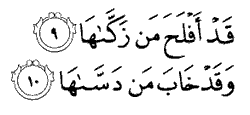Essence, Training Anger, Perfection
Issue 727 » March 1, 2013 - Rabi Al-Thani 19, 1434
Living The Quran
Essence
Surah Al-Shams (The Sun) Chapter 91: Verses 9-10
 "He is indeed prosperous who has grown it (the soul) in purity and he is indeed lost who has corrupted it."
"He is indeed prosperous who has grown it (the soul) in purity and he is indeed lost who has corrupted it."
Our essence is like a seed. If we use our potential and intellectual and spiritual faculties in this narrow world under the soil of the worldly life only to satisfy the fancies of our carnal, evil-commanding soul or selfhood, we will become corrupt, like a rotten seed, and merely enjoy fleeting pleasures during this short life. Thus, we will depart from this world with a heavy spiritual burden on our unfortunate souls.
But if we germinate the seed of our potential under the "soil of spirituality" with the "water of faith and worship," and if we use our spiritual faculties for their true purposes, we will grow into an eternal, majestic tree, the branches of which extend into eternity. We will yield fruit of virtue in the world and eternal happiness in the next world. We will be favoured in Paradise with infinite perfection and countless blessings.
All this means that we have been sent to the world to grow through knowledge and faith. And due to our special position among other beings, we have been entrusted with improving the earth through knowledge and faith and establishing justice on it. This imposes on us duties toward our Creator and other beings.
Compiled From:
"The Quran: Annotated Interpretation in Modern English" - Ali Unal, p. 1230
Understanding The Prophet's Life
Training Anger
A man asked the Prophet, peace be upon him, "Give me advice." The Prophet said, "Do not become angry." The man asked again, and the Prophet repeated his advice. For a third time, the man asked the question, and the Prophet said again, "Do not become angry." [Bukhari]
According to scholars like Imam al-Nawawi and others, when the Messenger of God said, "Do not become angry," he meant do not allow anger to lord over oneself and cause the loss of one's comportment. In other words, do not become anger, its embodiment, such that people only see your rage. Instead, control your anger and never lose control.
Anger is something that needs to be trained, not abolished, for if people completely suppressed their sense of anger, many of the injustices of the world would not have been opposed and tyranny would have gone unchecked. Without anger, people would go around with complete impunity and commit heinous acts without resistance from the people. Corruption would cover the face of the earth.
A person who has no feelings about oppression, wrongdoing and disbelief is, in fact, an impotent person emotionally. It has been said, "Evil flourishes when a few good people do not do anything to oppose it." Thus response to injustice and oppression in a civilized way is the appropriate expression of anger. Being neutral to injustice is equal to contributing to injustice.
Compiled From:
"Purification of The Heart" - Hamza Yusuf, pp. 102-103
"Anger and Dejection--An Islamic Perspective" - Shahid Athar
Blindspot!
Perfection
Improvement is a far more realistic goal than perfection. When we believe "we must be this" we ignore who or what we actually are, our capacity and our limitations. We start from the image of perfection, and of course, from perfection there is nowhere to go but down.
When we think, "I want my parents to see me as the perfect daughter," all we can do is fail. First, perfection is unattainable. Second, we can't control how people perceive us. Lastly, there is no way that we can do every single thing that is expected of us or that we expect of ourselves.
When our goal is growth and we say, "I'd like to improve this," we start from where and who we are. "I'd like to work on my relationship with my parents" is a completely different goal from "I want my parents to see me as the perfect daughter."
When we give ourselves permission to be imperfect, when we find self-worth despite our imperfections, when we build connection networks that affirm and value us as imperfect beings, we are much more capable of change.
Compiled From:
"I Thought It Was Just Me" - Brene Brown, p. 196